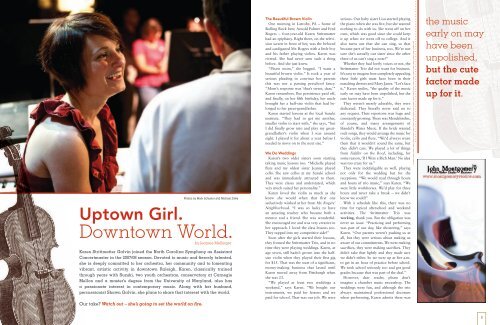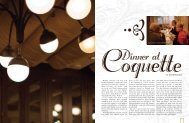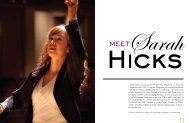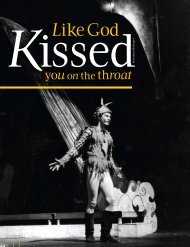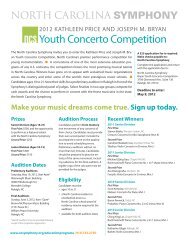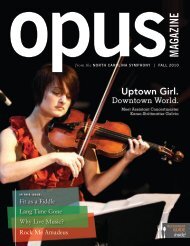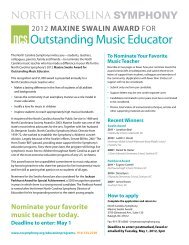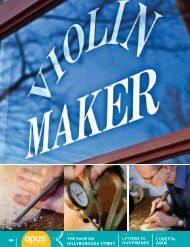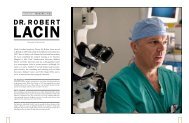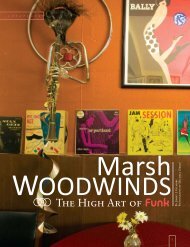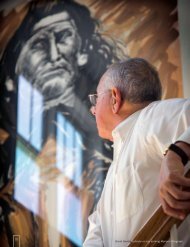Uptown Girl. Downtown World. - North Carolina Symphony
Uptown Girl. Downtown World. - North Carolina Symphony
Uptown Girl. Downtown World. - North Carolina Symphony
You also want an ePaper? Increase the reach of your titles
YUMPU automatically turns print PDFs into web optimized ePapers that Google loves.
<strong>Uptown</strong> <strong>Girl</strong>.<br />
<strong>Downtown</strong> <strong>World</strong>.<br />
by Jeannie Mellinger<br />
Karen Strittmatter Galvin joined the <strong>North</strong> <strong>Carolina</strong> <strong>Symphony</strong> as Assistant<br />
Concertmaster in the 2007/08 season. Devoted to music and fiercely talented,<br />
she is deeply committed to her orchestra, her community and to fomenting<br />
vibrant, artistic activity in downtown Raleigh. Karen, classically trained<br />
through years with Suzuki, two youth orchestras, conservatory at Carnegie<br />
Mellon and a master’s degree from the University of Maryland, also has<br />
a passionate interest in contemporary music. Along with her husband,<br />
percussionist Shawn Galvin, she plans to share that interest with the world.<br />
Our take? Watch out – she’s going to set the world on fire.<br />
Photos by Mark Schueler and Michael Zirkle<br />
The Beautiful Brown Violin<br />
One morning in Latrobe, PA – home of<br />
Rolling Rock beer, Arnold Palmer and Fred<br />
Rogers – four-year-old Karen Strittmatter<br />
had an epiphany. Right there, on the television<br />
screen in front of her, was the beloved<br />
and cardiganed Mr. Rogers with a little boy<br />
and his father playing violins. Karen was<br />
riveted. She had never seen such a thing<br />
before. And she just knew.<br />
“Please mom,” she begged. “I want a<br />
beautiful brown violin.” It took a year of<br />
serious pleading to convince her parents<br />
this was not a passing preschool fancy.<br />
“Mom’s response was ‘that’s sweet, dear,’”<br />
Karen remembers. But persistence paid off,<br />
and finally, on her fifth birthday, her uncle<br />
brought her a half-size violin that had belonged<br />
to her great-grandfather.<br />
Karen started lessons at the local Suzuki<br />
institute. “They had to get me another,<br />
smaller violin to start with,” she says, “but<br />
I did finally grow into and play my greatgrandfather’s<br />
violin when I was around<br />
eight. I played it for about a year before I<br />
needed to move on to the next size.”<br />
We Do Weddings<br />
Karen’s two older sisters soon starting<br />
taking music lessons too. “Michelle played<br />
flute and my oldest sister Jeanne played<br />
cello. She saw cellos at my Suzuki school<br />
and was immediately attracted to them.<br />
They were classy and understated, which<br />
very much suited her personality.”<br />
Karen loved the violin as much as she<br />
knew she would when that first one<br />
seductively winked at her from Mr. Rogers’<br />
Neighborhood. “I was so lucky to have<br />
an amazing teacher who became both a<br />
mentor and a friend. She was wonderful.<br />
She encouraged me and was very creative in<br />
her approach. I loved the class lessons too.<br />
They tapped into my competitive side!”<br />
Soon after the girls started their lessons,<br />
they formed the Strittmatter Trio, and in no<br />
time they were playing weddings. Karen, at<br />
age seven, still hadn’t grown into the halfsize<br />
violin when they played their first gig<br />
for $15. That was the start of a significant,<br />
money-making business that lasted until<br />
Karen moved away from Pittsburgh when<br />
she was 23.<br />
“We played at least two weddings a<br />
weekend,” says Karen. “We bought our<br />
instruments, we paid for lessons and we<br />
paid for school. That was our job. We were<br />
serious. Our baby sister Lisa started playing<br />
the piano when she was five, but she wanted<br />
nothing to do with us. She went off on her<br />
own, which was good since she could keep<br />
it up when we went off to college. And it<br />
also turns out that she can sing, so that<br />
became part of her business, too. We’re not<br />
sure she’s actually our sister since the other<br />
three of us can’t sing a note!”<br />
Whether they had lovely voices or not, the<br />
Strittmatter Trio did not want for business.<br />
It’s easy to imagine how completely appealing<br />
these little girls must have been in their<br />
matching dresses and Mary Janes. “Let’s face<br />
it,” Karen smiles, “the quality of the music<br />
early on may have been unpolished, but the<br />
cute factor made up for it.”<br />
They weren’t merely adorable, they were<br />
dedicated. They literally never said no to<br />
any request. Their repertoire was huge and<br />
constantly growing. There was Mendelssohn,<br />
of course, and many arrangements of<br />
Handel’s Water Music. If the bride wanted<br />
rock songs, they would arrange the music for<br />
violin, cello and flute. “We’d always warn<br />
them that it wouldn’t sound the same, but<br />
they didn’t care. We played a lot of things<br />
from Fiddler on the Roof, including, for<br />
some reason, ‘If I Were a Rich Man.’ No idea<br />
was too crazy for us.”<br />
They were indefatigable as well, playing<br />
not only for the wedding but for the<br />
receptions. “We would read through hours<br />
and hours of trio music,” says Karen. “We<br />
were little workhorses. We’d play for three<br />
hours and never take a break – we didn’t<br />
know we could!”<br />
With a schedule like this, there was no<br />
time for typical afterschool and weekend<br />
activities. The Strittmatter Trio was<br />
working, thank you. But the obligation was<br />
never an issue. “Practicing and performing<br />
was part of our day, like showering,” says<br />
Karen. “Our parents weren’t pushing us at<br />
all, but they were serious about making us<br />
aware of our commitments. We were making<br />
sacrifices, they were making sacrifices. They<br />
didn’t take that lightly and they made sure<br />
we didn’t either. So we were up at five a.m.<br />
to get in an hour of practice before school.<br />
We took school seriously too and got good<br />
grades because that was part of the deal.”<br />
However, dear reader, please don’t<br />
imagine a chamber music sweatshop. The<br />
weddings were fun, and although the trio<br />
always maintained professional decorum<br />
when performing, Karen admits there was<br />
the music<br />
early on may<br />
have been<br />
unpolished,<br />
but the cute<br />
factor made<br />
up for it.<br />
9
<strong>Uptown</strong> <strong>Girl</strong>. <strong>Downtown</strong> <strong>World</strong>.<br />
plenty of giggling when, for example, the<br />
bride’s dress is so tight that her father and<br />
new husband-to-be have to lift her up the<br />
five steps to the altar. And certainly the<br />
traditional western Pennsylvania cookie<br />
table was another major attraction for<br />
hard-working young musicians.<br />
There was plenty of time for fun at home,<br />
too. “We lived out in the country and so<br />
we’d spend a lot of time outside playing<br />
and just being kids. We didn’t have to log<br />
a certain number of hours practicing. We<br />
just understood that practice was about<br />
improving and if we improved, we were<br />
doing our job. Both of our parents came<br />
from huge families (14 and 11) and so they<br />
weren’t micromanagers. They understood<br />
that it’s OK to be independent as a child.”<br />
Up Another Set of Stairs<br />
In addition to her wedding business, Karen<br />
joined the Westmoreland Youth Orchestra<br />
when she was seven and by age ten, she was<br />
playing in the Pittsburgh Youth <strong>Symphony</strong>,<br />
the youngest musician at the time (ed. note:<br />
other PYS alums include NCS Associate<br />
Concertmaster Dovid Friedlander, violist<br />
Sandra Schwarcz and Resident Conductor<br />
William Henry Curry).<br />
New teachers were needed and so, when<br />
Karen was just 11-years-old, she and her<br />
sisters began studying with members of the<br />
Pittsburgh <strong>Symphony</strong>.<br />
“My poor dad is a heavy equipment<br />
operator,” Karen says, “and so three times<br />
a week he was behind the wheel again,<br />
driving one of us to Pittsburgh and back,<br />
an hour each way, in addition to ferrying us<br />
all over western Pennsylvania to weddings<br />
on the weekend. He was so exhausted he<br />
would often sleep during our lessons, or<br />
so we thought, but he was actually paying<br />
attention. He definitely became an educated<br />
consumer of music!”<br />
Karen’s teacher, Debbie Holland, was like<br />
a mother to her. “I still have this beautiful<br />
relationship with her,” she says. “I credit<br />
her with not just helping me become the<br />
violinist I chose to become, but she had a<br />
great influence on my personality and my<br />
development as a human being.”<br />
She also studied with Hong-Guang Jia and<br />
Huei Sheng Kao, both from China. Mr. Jia had<br />
lived through the Cultural Revolution, learning<br />
to play the violin by listening to Heifetz records<br />
in secret. Mr. Kao came alone to the Curtis<br />
Institute as a 16-year-old with no English.<br />
Together, they instilled in her a very specific<br />
work ethic. “You could make a mistake once,”<br />
says Karen, “but not twice. Their thinking was,<br />
why would you repeat a mistake?”<br />
“I was so lucky to grow up near<br />
Pittsburgh,” Karen says. “It’s a very cultural<br />
city and the music program was great. The<br />
city really loves its orchestra. Pittsburgh just<br />
Orchestra opportunities don’t<br />
come up just every day of the week,<br />
but soon one did, in Raleigh.<br />
likes winners in general. If you’re good at<br />
sports or you’re good at music, we like you!”<br />
The Love Factor<br />
Helping her perfect her gift as a violinist<br />
is not the only thing the Pittsburgh Youth<br />
<strong>Symphony</strong> offered Karen. Somewhere in<br />
the back of the orchestra was a really cute<br />
17-year-old percussionist named Shawn<br />
Galvin. Thirteen-year-old Karen had quite<br />
the crush. A good friend of Karen’s older<br />
sister Michelle and Michelle’s boyfriend, as<br />
well as a frequent third wheel on their dates,<br />
Shawn always joked that he was waiting for<br />
Karen to get older.<br />
As it turns out, he wasn’t kidding. “Two<br />
weeks after I graduated from high school, he<br />
called me. We went on our first date in June<br />
of that year and we’ve been together ever<br />
since.” Shawn went to Duquesne University<br />
and Karen to Carnegie Mellon, both<br />
conveniently located in Pittsburgh. They<br />
dated all through Karen’s college years, and<br />
meanwhile, Shawn won a job with the U.S.<br />
Navy Band in Washington, DC.<br />
When Karen graduated from conservatory,<br />
the two married. Karen went to the<br />
University of Maryland for graduate school.<br />
Of course, her interest in the program had a<br />
lot to do with Shawn being in Washington,<br />
but there were other great reasons to be there.<br />
The Guarneri String Quartet was in residence<br />
then, and there would be lessons and<br />
coaching with this renowned ensemble. Also<br />
at Maryland was a highly regarded violin<br />
pedagogue, Elisabeth Adkins. “She’s great,”<br />
says Karen, “and the perfect teacher for me<br />
to have, helping me bridge that gap between<br />
being a student and beginning a professional<br />
career. She was wonderful to me.”<br />
After graduate school, Karen won her first<br />
job with the Delaware <strong>Symphony</strong> and had<br />
her pick of interesting freelance opportunities<br />
with the Washington National Opera,<br />
chamber music ensembles at the embassies,<br />
and fun gigs like a Jethro Tull tour and the<br />
Clay Aiken Christmas tour. Shawn was happy<br />
in the Navy Band, which is as steady a job<br />
as you could ever hope to find. They bought<br />
a house. Everything was falling into place.<br />
Boxes were checked on the tick list. No need<br />
to change a thing. However...<br />
Siren Song of the South<br />
Orchestra opportunities don’t come up<br />
just every day of the week, but soon one did,<br />
in Raleigh. Happy and settled, Karen wasn’t<br />
paying that much attention to auditions.<br />
But Shawn encouraged her to take a look.<br />
The calendar was free. Shawn was free,<br />
too, which was unusual. Raleigh was just<br />
a short-ish drive. There was nothing to lose<br />
and an assistant concertmaster post to win.<br />
It was a bit scary to think of leaving a<br />
solid life in Washington behind and heading<br />
for an unknown part of the country. But<br />
just like the violin on Mr. Rogers, the <strong>North</strong><br />
<strong>Carolina</strong> <strong>Symphony</strong> winked, seductively.<br />
And so Karen said yes.<br />
Karen was one of three string players<br />
to join the orchestra that fall. David<br />
Kilbride, Assistant Principal Violin II, and<br />
Christopher Fischer, Assistant Principal<br />
Viola, were also new to the <strong>Symphony</strong>.<br />
“We had our own little support group,”<br />
says Karen. “But joining the orchestra<br />
was so easy. Everyone was so nice and<br />
accommodating and friendly. It’s interesting<br />
to talk to people in other orchestras<br />
because you see how functional our group<br />
is compared to others. My theory is that<br />
we get along because we have to spend so<br />
much time together on the bus!”<br />
Dream a Little Dream (or Two)<br />
Three years after their southbound leap<br />
of faith, Karen and Shawn know they made<br />
the right decision. “We love the city, we<br />
love the people we’ve met, and we love the<br />
fact that there’s a strong arts community<br />
here. We musicians are a creative bunch<br />
and an incredibly social bunch and one of<br />
the cool things about moving to Raleigh is<br />
being able to live downtown. We’ve found<br />
that there really is something to Southern<br />
hospitality. People want to talk to you and<br />
get to know you.”<br />
Karen and Shawn’s embrace of Raleigh<br />
is evidenced in their own ensemble, New<br />
Music Raleigh, a brainchild of their’s since<br />
they were dating. “Our dream was that we<br />
would collaborate with artists of all types<br />
and styles, in a less formal atmosphere,<br />
playing the music of contemporary composers<br />
in unconventional spaces. Such a dream.<br />
But now it’s time to do it. We’re so excited<br />
about it – me and Shawn and [fellow NCS<br />
violinist] Maria Evola. We’re just small<br />
potatoes now, but we plan to become a<br />
non-profit, develop an education program<br />
and be a force for modern music in the city.<br />
“We want our concerts to be about having<br />
the audience close to the music and<br />
playing music that fits with the time we live<br />
in right now. When I think about what we<br />
do at work, which I love, I think of it in<br />
the context of playing these beautiful masterworks,<br />
pieces of art. I’m performing a<br />
Leonardo DaVinci or a Renoir. We play in a<br />
formal space and we wear formal clothes to<br />
revere this music, to honor it. It’s the best of<br />
what we are as human beings. With NMR<br />
we want to lose a little of that reverence.<br />
“I think the institution of the orchestra is<br />
at a crossroads,” she continues. “I see what<br />
Shawn and I want to do as an outgrowth, a<br />
way of way of welcoming in new audiences<br />
who might be intimidated by a bunch of<br />
people on stage wearing tails and formal<br />
black, to simply come and experience music<br />
in a bar. There is this idea is that it’s elitist<br />
to come to hear a symphony orchestra, but<br />
once people get to know us they enjoy the<br />
experience more because they are watching<br />
a friend on stage. I want to know them<br />
too. I’m more excited about the experience<br />
knowing there are people in the audience<br />
that are excited to be there. That makes me<br />
play better.”<br />
Alongside this dream is the dream of<br />
building a home in downtown Raleigh,<br />
with a detached, soundproof percussion<br />
studio for Shawn, and perhaps a rooftop<br />
deck where they can look out over the lights<br />
of the city on a warm, summer night.<br />
They have their eye on a little property<br />
that fills the bill. “We’d love to be able to<br />
entertain and have concerts, so we want<br />
a big, open living space and maybe an<br />
outdoor living space as well,” Karen says.<br />
“We’re depositing as much money as we<br />
possibly can before going to the bank, but<br />
we’ve been talking to an architect we adore.<br />
I found him online and emailed, saying,<br />
‘we’re musicians, we have no money, but<br />
would you be interested in working with<br />
us?’ He wrote this beautiful response telling<br />
us that his dad was a musicologist and he<br />
grew up in a house where the piano blocked<br />
the TV. He got us immediately. Being a<br />
musician and fitting into a regular house is<br />
hard to do – especially with all of Shawn’s<br />
percussion equipment. So if we can start<br />
from the ground up and build something<br />
that suits our needs from the beginning that<br />
would be great. It’s so exciting that we can<br />
do this in Raleigh.”<br />
Giving Back<br />
Along with the commitment to music<br />
is commitment to other aspects of the<br />
community. Karen has been involved with<br />
Community Hope, a literacy mentoring<br />
program sponsored by the YMCA that<br />
pairs adults with young children, one on<br />
one. Although she isn’t able to continue as a<br />
mentor this year, she plans to stay involved<br />
by fundraising for the program. She would<br />
also like to work with the organization to<br />
help them find more nutritious sources for<br />
the snacks they provide.<br />
She and Shawn have enjoyed working for<br />
their favorite political candidates and Karen<br />
plans to become involved with the bike and<br />
pedestrian lobby in Raleigh. “I want to start<br />
researching and lobbying for better bike<br />
paths and safer pedestrian crossings,” she<br />
says. “Anything to make Raleigh a more<br />
bikeable, walkable, safer city. It is such an<br />
awesome community with all these great<br />
neighborhoods close to downtown and so<br />
many wonderful places to go. It just makes<br />
sense to hop on your bike instead of getting<br />
in your car to go four blocks. And we have<br />
so many beautiful days here. But it needs to<br />
be safer.”<br />
Karen, along with some of her colleagues,<br />
has performed at the Women’s Shelter (“I<br />
10<br />
Top to bottom: Karen with a student; Karen performing; husband<br />
Shawn at New Music Raleigh concert; Karen, Shawn and Sadie<br />
11
<strong>Uptown</strong> <strong>Girl</strong>. <strong>Downtown</strong> <strong>World</strong>.<br />
The best seat<br />
in the house<br />
is the seat I sit<br />
in – there’s so<br />
much energy<br />
that happens<br />
on stage<br />
also want to be an advocate for the homeless<br />
in Raleigh”) and raised money for UNICEF<br />
after the earthquake in Haiti (“We need to do<br />
something now for Pakistan”). “There are so<br />
many opportunities to be involved,” she says.<br />
“The community feels very active here.”<br />
She also maintains an active teaching<br />
studio and coaches the Young All-Stars, an<br />
exclusive chamber orchestra for advanced<br />
high school musicians led by Music Director<br />
Grant Llewellyn. “Just giving them those<br />
skills, telling them, ‘Yes you can move your<br />
chairs so you can see a little better, the inside<br />
player turns the page, try using this part of<br />
your bow – little things like that and you see<br />
them start to figure out the rhythm of what<br />
works in an orchestra, what makes a good<br />
stand partner.’ I loved doing that. I’ve been<br />
working with Triangle Youth Philharmonic<br />
a little bit, as well – doing some coaching<br />
and listening to their auditions.”<br />
Whew. But who would expect less from the<br />
girl who had a wedding business at age seven?<br />
On Being a Musician<br />
“I’ve never thought of this as just a job,”<br />
says Karen. “When musicians go out, when<br />
we hang out together, the conversations<br />
are constantly about honing our craft. It<br />
never leaves our minds. So much of how<br />
we feel about ourselves as human beings is<br />
reflected in how we feel about ourselves as<br />
musicians, which can be really hard when<br />
you’re in a slump. We’re taught to be very<br />
self-critical – that’s part of our training and<br />
how we improve.”<br />
One of the brilliant advantages, though, of<br />
being a musician in an orchestra, is that you<br />
have colleagues to support you, particularly<br />
in the string sections. “We are very much<br />
a team,” Karen says. “We depend on each<br />
other and on our stand partners. I’m so lucky<br />
to sit with Bekah [ed note: Rebekah Binford,<br />
Assistant Concertmaster]. She’s such a strong<br />
and beautiful player and a beautiful person.<br />
I just adore her and sitting with her gives me<br />
an extra sense of security.”<br />
Other than sometimes having to miss a<br />
friend’s wedding or being unable to travel<br />
at Thanksgiving or New Year’s, Karen can’t<br />
think of a real downside to being a musician.<br />
“Every once in a while,” she says, “I’ll<br />
have that moment when I’m caught up in<br />
the beauty of what’s happening and think<br />
– wow, this is my job, I can’t believe that!<br />
“You know, when we sit down to play, we<br />
are focused on expressing art. We have our<br />
own special kind of religion. After a concert,<br />
to have experienced that transformation…maybe<br />
you’ve just played a Mahler<br />
<strong>Symphony</strong> and it was incredibly beautiful<br />
and you overcame obstacles and difficulties<br />
to create this transformative piece of music…it’s<br />
more than adrenaline.” She stops,<br />
shaking her head. “There aren’t words.<br />
It’s a religious experience. The audience<br />
applauds and that means so much to us to<br />
know that we’ve shared this not with just<br />
the people on stage, but the audience was<br />
part of that experience as well. It puts you in<br />
touch with your humanity. It is so uplifting.<br />
“For me, as a musician, I sometimes look<br />
out at the audience and I feel so bad that<br />
they are sitting way out there. The best seat<br />
in the house is the seat I sit in – there’s so<br />
much energy that happens on stage.”<br />
2035<br />
What does the future hold for this dynamic<br />
and talented young force of nature?<br />
Karen definitely expects to always love playing.<br />
“And I’ll still be teaching,” she says,<br />
“because I love teaching. I’ll be enjoying as<br />
much free time as I possibly can. I’ll have a<br />
big garden with lots of big trees. And I will<br />
travel in all of my off time. And outside of<br />
work, I will still be involved in individual<br />
projects – that’s gotten to a big part of what<br />
I do.”<br />
What else does she see in her crystal ball?<br />
“In twenty-five years, New Music Raleigh<br />
will still be going strong and is now an<br />
institution. My vision is for it to be a vehicle<br />
for young composers, young musicians –<br />
commissioning work and really being at the<br />
forefront of what’s happening in new music<br />
and doing new ideas and creative things.<br />
Shawn and I would like to find a way to<br />
fund commissions and have competitions<br />
and find ways to inspire composers to be<br />
creative about how they write for groups<br />
and offer showcases for young musicians.<br />
“The other thing I see for myself in<br />
twenty-five years is still being very active<br />
in my community where I live. That’s very<br />
important to me and something I’ve enjoyed<br />
since I moved to Raleigh.”<br />
Most of all, though, Karen wants to see<br />
music thriving and reaching new audiences,<br />
and of course, she and Shawn will be a part<br />
of that. “I want to introduce as many people<br />
as possible to the experience of hearing the<br />
orchestra live. It’s this massive organism<br />
made up of all these very different people,<br />
all working for the same goal together. And<br />
not just that – the audience is very integral<br />
to the performance as well. You know when<br />
they love it, and when they’re not too sure.<br />
It makes you play better when you know<br />
the performance is being received well. You<br />
never know what’s going to happen – that’s<br />
part of the excitement. Maybe this sounds<br />
cheesy, but it restores your faith in humanity<br />
to see that people can come together to<br />
create something that beautiful. I think it’s<br />
a miracle when that happens.”<br />
12<br />
13


